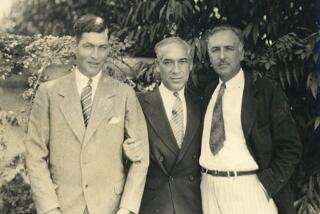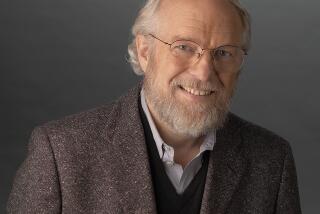Bob Wallace, 53; Pioneer in Computer Software
- Share via
Bob Wallace, a computer software pioneer and an early Microsoft employee who struck out on his own in the early 1980s by launching the Seattle-based Quicksoft software company, has died. He was 53.
Wallace, who believed that being a computer programmer was the best way to enhance the mind and in recent years sold books about hallucinogenic and psychedelic drugs on a Web site, died at his home Sept. 20 in San Rafael, Calif. The results of an autopsy are pending.
As owner, president and chief programmer of Quicksoft, which he founded in 1983, Wallace used an unorthodox marketing strategy, called “shareware,” to sell the word processing program he wrote, PC-Write.
Operating under the philosophy of “making a living, not a killing,” Wallace encouraged users to copy and share the $10 PC-Write diskette and then pay to register the program after trying it out.
Users who paid the $75 annual registration fee received the benefits of a printed manual, telephone support, Quicksoft’s newsletters and two program updates.
“I don’t worry about the people who don’t register,” Wallace told Associated Press in 1989. “I worry about the people who do register. I want to make sure they’re happy. If they’re happy and we’re making a reasonable profit, that’s good.”
By 1989, the company had 32 employees and annual sales of more than $2 million.
More than 10,000 people wound up paying the registration fee, Megan Dana-Wallace, Wallace’s wife, said Thursday. But a lot of users didn’t pay to register.
“They just used it for free, so we never really got rich doing that,” said Dana-Wallace, Quicksoft’s first employee and an artist, who drew Quicksoft’s trademark “office cat” on the company’s literature. (The cat, Microsoft, is now 19 years old.)
Dana-Wallace, who was separated from Wallace at the time of his death, said her husband enjoyed doing new things.
“He was a real innovator,” she said.
“His idea was as long as we could make a living doing it, that was all we needed, and more people would be able to use the product,” she said.
“He was basically an old hippie.”
Said Jonathan Feil, a Seattle software-business attorney and longtime friend of Wallace’s:
“Bob was a very early enthusiast in microcomputers as a way of giving people the potential to change their lives, and like many others in the pioneer [days of computers], he was more interested in doing good than necessarily doing well.”
In 1991, with Quicksoft unprofitable and requiring more of Wallace’s money to keep it going, he sold the company.
He continued working for Quicksoft’s new owner until the company went out of business in 1993.
He was born in Washington, D.C., in 1949. His father, Robert Wallace, was an economist who became an assistant secretary of the Treasury during the Kennedy administration.
The younger Wallace set the course of his life in motion at age 11.
“I read a Reader’s Digest article, ‘The Man Who Talked to Machines,’ ” he told Associated Press.
“I was one of the people who just knew, then, I would be a programmer,” he added.
He first worked on computers as a member of an Explorer Scout troop sponsored by Control Data Corp. in Bethesda, Md.
He later studied computers at Brown University and was one of the key designers of an early computer file retrieval and editing system known as Fress.
Wallace moved to Seattle to study computers at the University of Washington, where he earned a master’s degree in computer science in 1978.
By then, he had founded the Northwest Computer Society and had run the first Seattle Personal Computer Fair.
He was working at Seattle’s first computer store in 1978 when he saw a sign posted by young Bill Gates seeking programmers for his tiny new company, then based in Albuquerque, N.M.
After joining Microsoft as its ninth employee, Wallace developed an early version of the Pascal programming language.
“Bob was a great early contributor to Microsoft,” Gates said in a statement this week.
Wallace, his widow recalled, “was one of those very brilliant people who just focused on something they were interested in, to the exclusion of almost everything else. Most of the high-level people at Microsoft were like that.”
By 1983, after five years at Microsoft, Wallace thought that he was getting lost in the quickly expanding company and decided to go into business for himself.
“He basically wrote the first version of PC-Write over a Thanksgiving weekend,” Feil said.
When Wallace quit Microsoft, three years before the company went public, he left with 450 shares of stock options that multiplied with numerous stock splits to more than 100,000 shares worth, at the peak of the market, $15 million.
After Quicksoft folded in 1993, Wallace moved to California.
Long interested in the mind-expanding potential of psychedelic drugs, he started Mind Books, a mail order source for books about them, in 1996.
Two years later, he established the Promind Foundation to fund scientific research, public education and harm-reduction efforts related to psychedelics.
In addition to his widow, Wallace is survived by his mother, Luna, of Tucson; a brother, Douglas, of Seattle; and a sister, Wendy, of Tucson.






